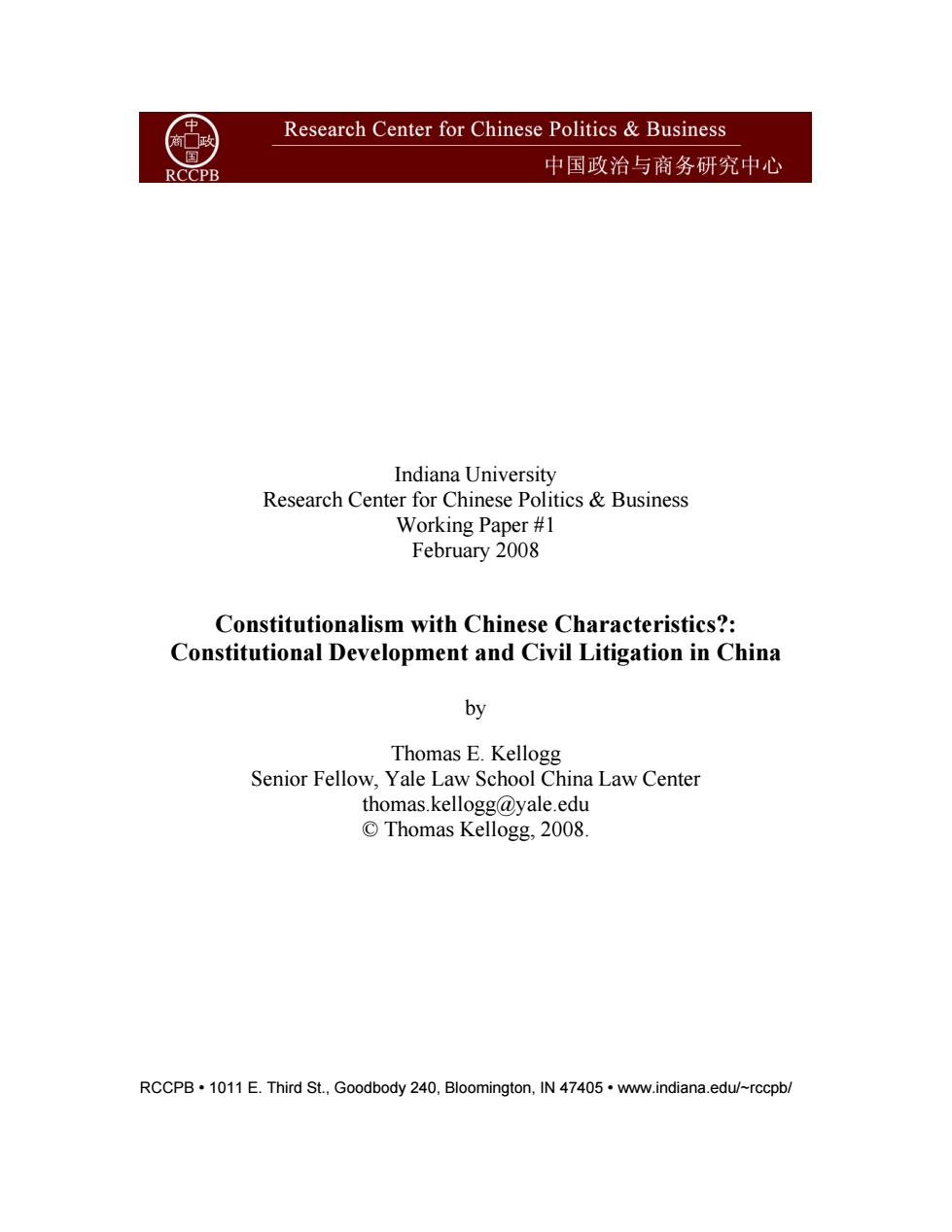
中 Research Center for Chinese Politics Business 商政 国 RCCPB 中国政治与商务研究中心 Indiana University Research Center for Chinese Politics Business Working Paper #1 February 2008 Constitutionalism with Chinese Characteristics?: Constitutional Development and Civil Litigation in China by Thomas E.Kellogg Senior Fellow,Yale Law School China Law Center thomas.kellogg@yale.edu Thomas Kellogg,2008. RCCPB.1011 E.Third St.,Goodbody 240,Bloomington,IN 47405.ww.indiana.edu/~rccpb/
Indiana University Research Center for Chinese Politics & Business Working Paper #1 February 2008 Constitutionalism with Chinese Characteristics?: Constitutional Development and Civil Litigation in China by Thomas E. Kellogg Senior Fellow, Yale Law School China Law Center thomas.kellogg@yale.edu © Thomas Kellogg, 2008. RCCPB • 1011 E. Third St., Goodbody 240, Bloomington, IN 47405 • www.indiana.edu/~rccpb/
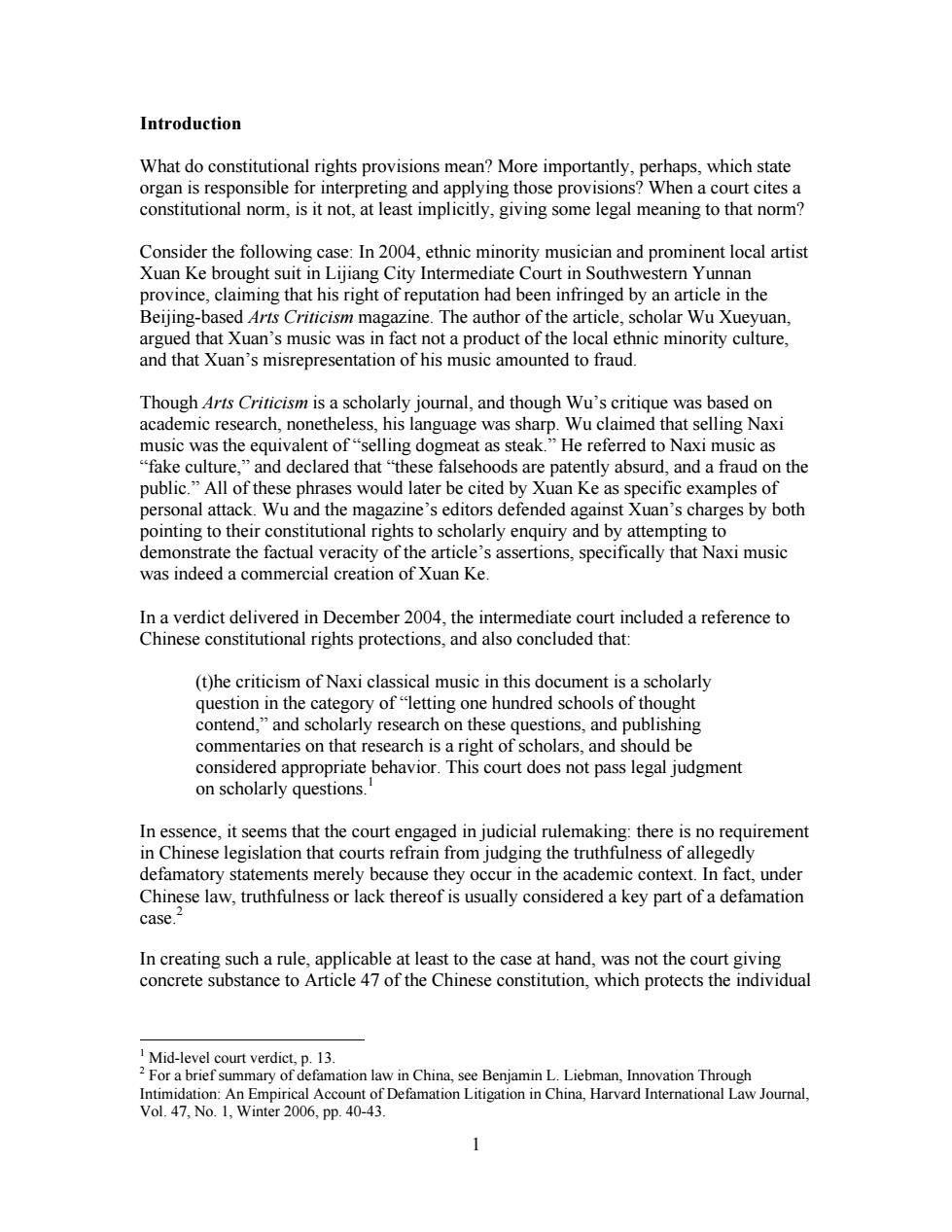
Introduction What do constitutional rights provisions mean?More importantly,perhaps,which state organ is responsible for interpreting and applying those provisions?When a court cites a constitutional norm,is it not,at least implicitly,giving some legal meaning to that norm? Consider the following case:In 2004,ethnic minority musician and prominent local artist Xuan Ke brought suit in Lijiang City Intermediate Court in Southwestern Yunnan province,claiming that his right of reputation had been infringed by an article in the Beijing-based Arts Criticism magazine.The author of the article,scholar Wu Xueyuan, argued that Xuan's music was in fact not a product of the local ethnic minority culture, and that Xuan's misrepresentation of his music amounted to fraud. Though Arts Criticism is a scholarly journal,and though Wu's critique was based on academic research,nonetheless,his language was sharp.Wu claimed that selling Naxi music was the equivalent of"selling dogmeat as steak."He referred to Naxi music as "fake culture,"and declared that"these falsehoods are patently absurd,and a fraud on the public."All of these phrases would later be cited by Xuan Ke as specific examples of personal attack.Wu and the magazine's editors defended against Xuan's charges by both pointing to their constitutional rights to scholarly enquiry and by attempting to demonstrate the factual veracity of the article's assertions,specifically that Naxi music was indeed a commercial creation of Xuan Ke. In a verdict delivered in December 2004,the intermediate court included a reference to Chinese constitutional rights protections,and also concluded that: (t)he criticism of Naxi classical music in this document is a scholarly question in the category of"letting one hundred schools of thought contend,"and scholarly research on these questions,and publishing commentaries on that research is a right of scholars,and should be considered appropriate behavior.This court does not pass legal judgment on scholarly questions. In essence,it seems that the court engaged in judicial rulemaking:there is no requirement in Chinese legislation that courts refrain from judging the truthfulness of allegedly defamatory statements merely because they occur in the academic context.In fact,under Chinese law,truthfulness or lack thereof is usually considered a key part of a defamation case.2 In creating such a rule,applicable at least to the case at hand,was not the court giving concrete substance to Article 47 of the Chinese constitution,which protects the individual Mid-level court verdict,p.13. 2 For a brief summary of defamation law in China,see Benjamin L.Liebman,Innovation Through Intimidation:An Empirical Account of Defamation Litigation in China,Harvard International Law Journal. Vol.47,No.1,Winter 2006,pp.40-43. 1
1 Introduction What do constitutional rights provisions mean? More importantly, perhaps, which state organ is responsible for interpreting and applying those provisions? When a court cites a constitutional norm, is it not, at least implicitly, giving some legal meaning to that norm? Consider the following case: In 2004, ethnic minority musician and prominent local artist Xuan Ke brought suit in Lijiang City Intermediate Court in Southwestern Yunnan province, claiming that his right of reputation had been infringed by an article in the Beijing-based Arts Criticism magazine. The author of the article, scholar Wu Xueyuan, argued that Xuan’s music was in fact not a product of the local ethnic minority culture, and that Xuan’s misrepresentation of his music amounted to fraud. Though Arts Criticism is a scholarly journal, and though Wu’s critique was based on academic research, nonetheless, his language was sharp. Wu claimed that selling Naxi music was the equivalent of “selling dogmeat as steak.” He referred to Naxi music as “fake culture,” and declared that “these falsehoods are patently absurd, and a fraud on the public.” All of these phrases would later be cited by Xuan Ke as specific examples of personal attack. Wu and the magazine’s editors defended against Xuan’s charges by both pointing to their constitutional rights to scholarly enquiry and by attempting to demonstrate the factual veracity of the article’s assertions, specifically that Naxi music was indeed a commercial creation of Xuan Ke. In a verdict delivered in December 2004, the intermediate court included a reference to Chinese constitutional rights protections, and also concluded that: (t)he criticism of Naxi classical music in this document is a scholarly question in the category of “letting one hundred schools of thought contend,” and scholarly research on these questions, and publishing commentaries on that research is a right of scholars, and should be considered appropriate behavior. This court does not pass legal judgment on scholarly questions.1 In essence, it seems that the court engaged in judicial rulemaking: there is no requirement in Chinese legislation that courts refrain from judging the truthfulness of allegedly defamatory statements merely because they occur in the academic context. In fact, under Chinese law, truthfulness or lack thereof is usually considered a key part of a defamation case.2 In creating such a rule, applicable at least to the case at hand, was not the court giving concrete substance to Article 47 of the Chinese constitution, which protects the individual 1 Mid-level court verdict, p. 13. 2 For a brief summary of defamation law in China, see Benjamin L. Liebman, Innovation Through Intimidation: An Empirical Account of Defamation Litigation in China, Harvard International Law Journal, Vol. 47, No. 1, Winter 2006, pp. 40-43
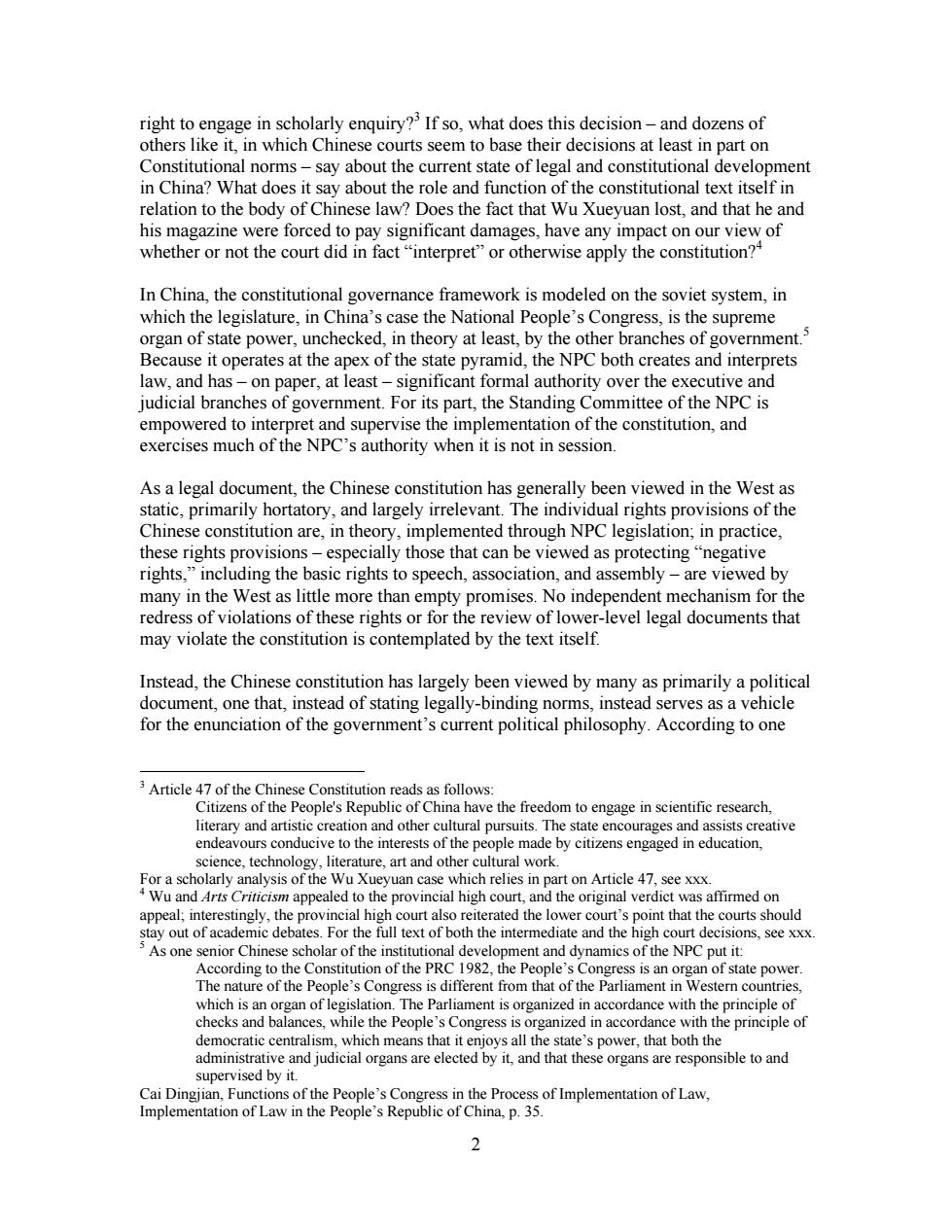
right to engage in scholarly enquiry?If so,what does this decision-and dozens of others like it,in which Chinese courts seem to base their decisions at least in part on Constitutional norms-say about the current state of legal and constitutional development in China?What does it say about the role and function of the constitutional text itself in relation to the body of Chinese law?Does the fact that Wu Xueyuan lost,and that he and his magazine were forced to pay significant damages,have any impact on our view of whether or not the court did in fact"interpret"or otherwise apply the constitution? In China,the constitutional governance framework is modeled on the soviet system,in which the legislature,in China's case the National People's Congress,is the supreme organ of state power,unchecked,in theory at least,by the other branches of government.5 Because it operates at the apex of the state pyramid,the NPC both creates and interprets law,and has-on paper,at least-significant formal authority over the executive and judicial branches of government.For its part,the Standing Committee of the NPC is empowered to interpret and supervise the implementation of the constitution,and exercises much of the NPC's authority when it is not in session. As a legal document,the Chinese constitution has generally been viewed in the West as static,primarily hortatory,and largely irrelevant.The individual rights provisions of the Chinese constitution are,in theory,implemented through NPC legislation;in practice, these rights provisions-especially those that can be viewed as protecting "negative rights,"including the basic rights to speech,association,and assembly-are viewed by many in the West as little more than empty promises.No independent mechanism for the redress of violations of these rights or for the review of lower-level legal documents that may violate the constitution is contemplated by the text itself. Instead,the Chinese constitution has largely been viewed by many as primarily a political document,one that,instead of stating legally-binding norms,instead serves as a vehicle for the enunciation of the government's current political philosophy.According to one 3 Article 47 of the Chinese Constitution reads as follows: Citizens of the People's Republic of China have the freedom to engage in scientific research, literary and artistic creation and other cultural pursuits.The state encourages and assists creative endeavours conducive to the interests of the people made by citizens engaged in education, science,technology,literature,art and other cultural work. For a scholarly analysis of the Wu Xueyuan case which relies in part on Article 47,see xxx. Wu and Arts Criticism appealed to the provincial high court,and the original verdict was affirmed on appeal;interestingly,the provincial high court also reiterated the lower court's point that the courts should stay out of academic debates.For the full text of both the intermediate and the high court decisions,see xxx. 5 As one senior Chinese scholar of the institutional development and dynamics of the NPC put it: According to the Constitution of the PRC 1982,the People's Congress is an organ of state power. The nature of the People's Congress is different from that of the Parliament in Western countries, which is an organ of legislation.The Parliament is organized in accordance with the principle of checks and balances,while the People's Congress is organized in accordance with the principle of democratic centralism,which means that it enjoys all the state's power,that both the administrative and judicial organs are elected by it,and that these organs are responsible to and supervised by it. Cai Dingjian,Functions of the People's Congress in the Process of Implementation of Law, Implementation of Law in the People's Republic of China,p.35. 2
2 right to engage in scholarly enquiry?3 If so, what does this decision – and dozens of others like it, in which Chinese courts seem to base their decisions at least in part on Constitutional norms – say about the current state of legal and constitutional development in China? What does it say about the role and function of the constitutional text itself in relation to the body of Chinese law? Does the fact that Wu Xueyuan lost, and that he and his magazine were forced to pay significant damages, have any impact on our view of whether or not the court did in fact “interpret” or otherwise apply the constitution?4 In China, the constitutional governance framework is modeled on the soviet system, in which the legislature, in China’s case the National People’s Congress, is the supreme organ of state power, unchecked, in theory at least, by the other branches of government.5 Because it operates at the apex of the state pyramid, the NPC both creates and interprets law, and has – on paper, at least – significant formal authority over the executive and judicial branches of government. For its part, the Standing Committee of the NPC is empowered to interpret and supervise the implementation of the constitution, and exercises much of the NPC’s authority when it is not in session. As a legal document, the Chinese constitution has generally been viewed in the West as static, primarily hortatory, and largely irrelevant. The individual rights provisions of the Chinese constitution are, in theory, implemented through NPC legislation; in practice, these rights provisions – especially those that can be viewed as protecting “negative rights,” including the basic rights to speech, association, and assembly – are viewed by many in the West as little more than empty promises. No independent mechanism for the redress of violations of these rights or for the review of lower-level legal documents that may violate the constitution is contemplated by the text itself. Instead, the Chinese constitution has largely been viewed by many as primarily a political document, one that, instead of stating legally-binding norms, instead serves as a vehicle for the enunciation of the government’s current political philosophy. According to one 3 Article 47 of the Chinese Constitution reads as follows: Citizens of the People's Republic of China have the freedom to engage in scientific research, literary and artistic creation and other cultural pursuits. The state encourages and assists creative endeavours conducive to the interests of the people made by citizens engaged in education, science, technology, literature, art and other cultural work. For a scholarly analysis of the Wu Xueyuan case which relies in part on Article 47, see xxx. 4 Wu and Arts Criticism appealed to the provincial high court, and the original verdict was affirmed on appeal; interestingly, the provincial high court also reiterated the lower court’s point that the courts should stay out of academic debates. For the full text of both the intermediate and the high court decisions, see xxx. 5 As one senior Chinese scholar of the institutional development and dynamics of the NPC put it: According to the Constitution of the PRC 1982, the People’s Congress is an organ of state power. The nature of the People’s Congress is different from that of the Parliament in Western countries, which is an organ of legislation. The Parliament is organized in accordance with the principle of checks and balances, while the People’s Congress is organized in accordance with the principle of democratic centralism, which means that it enjoys all the state’s power, that both the administrative and judicial organs are elected by it, and that these organs are responsible to and supervised by it. Cai Dingjian, Functions of the People’s Congress in the Process of Implementation of Law, Implementation of Law in the People’s Republic of China, p. 35
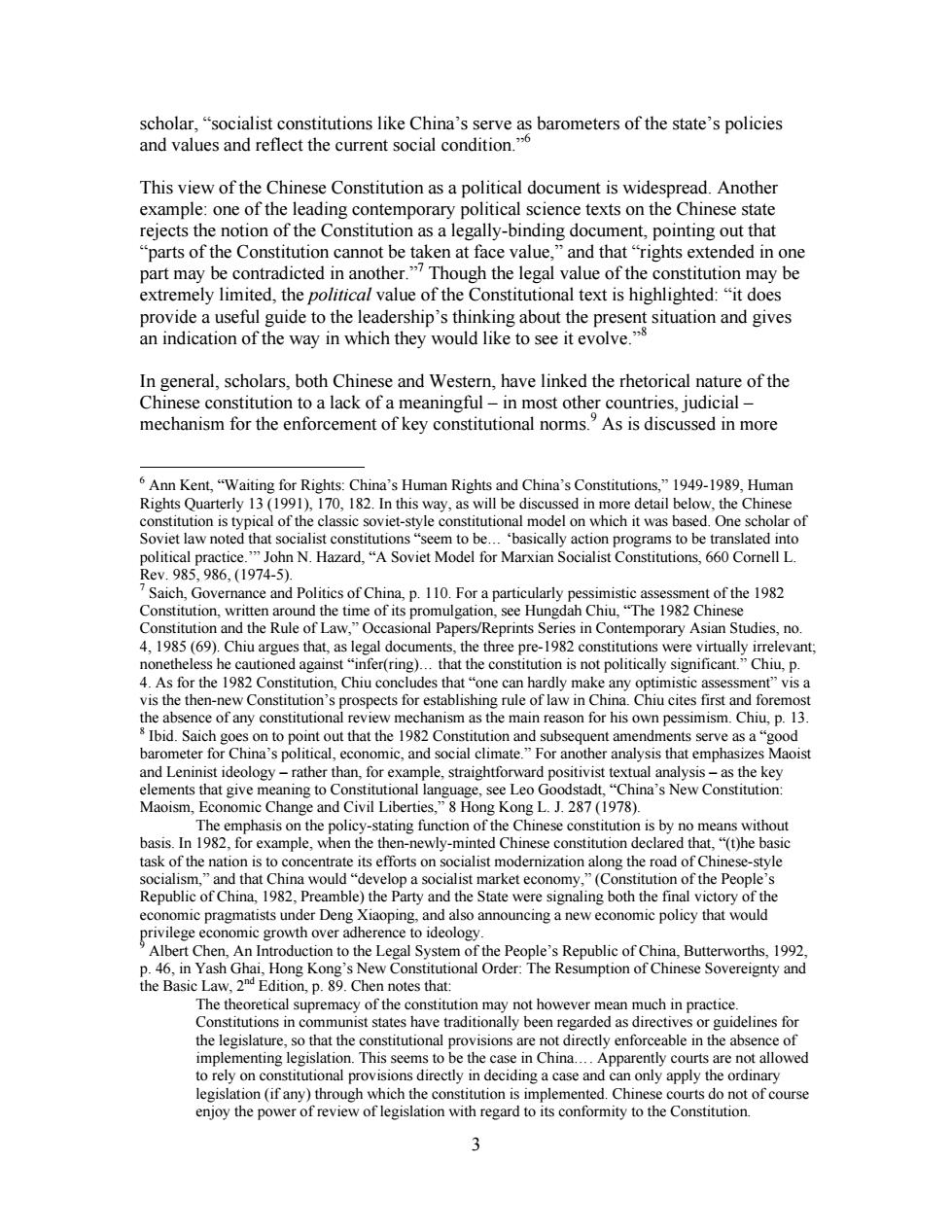
scholar,"socialist constitutions like China's serve as barometers of the state's policies and values and reflect the current social condition." This view of the Chinese Constitution as a political document is widespread.Another example:one of the leading contemporary political science texts on the Chinese state rejects the notion of the Constitution as a legally-binding document,pointing out that "parts of the Constitution cannot be taken at face value,"and that"rights extended in one part may be contradicted in another."7 Though the legal value of the constitution may be extremely limited,the political value of the Constitutional text is highlighted:"it does provide a useful guide to the leadership's thinking about the present situation and gives an indication of the way in which they would like to see it evolve."8 In general,scholars,both Chinese and Western,have linked the rhetorical nature of the Chinese constitution to a lack of a meaningful-in most other countries,judicial- mechanism for the enforcement of key constitutional norms.As is discussed in more 6 Ann Kent,"Waiting for Rights:China's Human Rights and China's Constitutions,"1949-1989,Human Rights Quarterly 13(1991),170,182.In this way,as will be discussed in more detail below,the Chinese constitution is typical of the classic soviet-style constitutional model on which it was based.One scholar of Soviet law noted that socialist constitutions"seem to be...'basically action programs to be translated into political practice.""John N.Hazard,"A Soviet Model for Marxian Socialist Constitutions,660 Cornell L. Rev.985.986.(1974-5). Saich,Governance and Politics of China,p.110.For a particularly pessimistic assessment of the 1982 Constitution,written around the time of its promulgation,see Hungdah Chiu,"The 1982 Chinese Constitution and the Rule of Law,"Occasional Papers/Reprints Series in Contemporary Asian Studies,no. 4,1985(69).Chiu argues that,as legal documents,the three pre-1982 constitutions were virtually irrelevant; nonetheless he cautioned against"infer(ring)...that the constitution is not politically significant."Chiu,p. 4.As for the 1982 Constitution,Chiu concludes that"one can hardly make any optimistic assessment"vis a vis the then-new Constitution's prospects for establishing rule of law in China.Chiu cites first and foremost the absence of any constitutional review mechanism as the main reason for his own pessimism.Chiu,p.13 s Ibid.Saich goes on to point out that the 1982 Constitution and subsequent amendments serve as a"good barometer for China's political,economic,and social climate."For another analysis that emphasizes Maoist and Leninist ideology-rather than,for example,straightforward positivist textual analysis-as the key elements that give meaning to Constitutional language,see Leo Goodstadt,"China's New Constitution: Maoism,Economic Change and Civil Liberties,"8 Hong Kong L.J.287(1978). The emphasis on the policy-stating function of the Chinese constitution is by no means without basis.In 1982,for example,when the then-newly-minted Chinese constitution declared that,"(t)he basic task of the nation is to concentrate its efforts on socialist modernization along the road of Chinese-style socialism,"and that China would"develop a socialist market economy,"(Constitution of the People's Republic of China,1982,Preamble)the Party and the State were signaling both the final victory of the economic pragmatists under Deng Xiaoping,and also announcing a new economic policy that would privilege economic growth over adherence to ideology. Albert Chen,An Introduction to the Legal System of the People's Republic of China,Butterworths,1992 p.46,in Yash Ghai,Hong Kong's New Constitutional Order:The Resumption of Chinese Sovereignty and the Basic Law,2nd Edition,p.89.Chen notes that: The theoretical supremacy of the constitution may not however mean much in practice. Constitutions in communist states have traditionally been regarded as directives or guidelines for the legislature,so that the constitutional provisions are not directly enforceable in the absence of implementing legislation.This seems to be the case in China....Apparently courts are not allowed to rely on constitutional provisions directly in deciding a case and can only apply the ordinary legislation (if any)through which the constitution is implemented.Chinese courts do not of course enjoy the power of review of legislation with regard to its conformity to the Constitution. 3
3 scholar, “socialist constitutions like China’s serve as barometers of the state’s policies and values and reflect the current social condition.”6 This view of the Chinese Constitution as a political document is widespread. Another example: one of the leading contemporary political science texts on the Chinese state rejects the notion of the Constitution as a legally-binding document, pointing out that “parts of the Constitution cannot be taken at face value,” and that “rights extended in one part may be contradicted in another.”7 Though the legal value of the constitution may be extremely limited, the political value of the Constitutional text is highlighted: “it does provide a useful guide to the leadership’s thinking about the present situation and gives an indication of the way in which they would like to see it evolve.”8 In general, scholars, both Chinese and Western, have linked the rhetorical nature of the Chinese constitution to a lack of a meaningful – in most other countries, judicial – mechanism for the enforcement of key constitutional norms.9 As is discussed in more 6 Ann Kent, “Waiting for Rights: China’s Human Rights and China’s Constitutions,” 1949-1989, Human Rights Quarterly 13 (1991), 170, 182. In this way, as will be discussed in more detail below, the Chinese constitution is typical of the classic soviet-style constitutional model on which it was based. One scholar of Soviet law noted that socialist constitutions “seem to be… ‘basically action programs to be translated into political practice.’” John N. Hazard, “A Soviet Model for Marxian Socialist Constitutions, 660 Cornell L. Rev. 985, 986, (1974-5). 7 Saich, Governance and Politics of China, p. 110. For a particularly pessimistic assessment of the 1982 Constitution, written around the time of its promulgation, see Hungdah Chiu, “The 1982 Chinese Constitution and the Rule of Law,” Occasional Papers/Reprints Series in Contemporary Asian Studies, no. 4, 1985 (69). Chiu argues that, as legal documents, the three pre-1982 constitutions were virtually irrelevant; nonetheless he cautioned against “infer(ring)… that the constitution is not politically significant.” Chiu, p. 4. As for the 1982 Constitution, Chiu concludes that “one can hardly make any optimistic assessment” vis a vis the then-new Constitution’s prospects for establishing rule of law in China. Chiu cites first and foremost the absence of any constitutional review mechanism as the main reason for his own pessimism. Chiu, p. 13. 8 Ibid. Saich goes on to point out that the 1982 Constitution and subsequent amendments serve as a “good barometer for China’s political, economic, and social climate.” For another analysis that emphasizes Maoist and Leninist ideology – rather than, for example, straightforward positivist textual analysis – as the key elements that give meaning to Constitutional language, see Leo Goodstadt, “China’s New Constitution: Maoism, Economic Change and Civil Liberties,” 8 Hong Kong L. J. 287 (1978). The emphasis on the policy-stating function of the Chinese constitution is by no means without basis. In 1982, for example, when the then-newly-minted Chinese constitution declared that, “(t)he basic task of the nation is to concentrate its efforts on socialist modernization along the road of Chinese-style socialism,” and that China would “develop a socialist market economy,” (Constitution of the People’s Republic of China, 1982, Preamble) the Party and the State were signaling both the final victory of the economic pragmatists under Deng Xiaoping, and also announcing a new economic policy that would privilege economic growth over adherence to ideology. 9 Albert Chen, An Introduction to the Legal System of the People’s Republic of China, Butterworths, 1992, p. 46, in Yash Ghai, Hong Kong’s New Constitutional Order: The Resumption of Chinese Sovereignty and the Basic Law, 2nd Edition, p. 89. Chen notes that: The theoretical supremacy of the constitution may not however mean much in practice. Constitutions in communist states have traditionally been regarded as directives or guidelines for the legislature, so that the constitutional provisions are not directly enforceable in the absence of implementing legislation. This seems to be the case in China…. Apparently courts are not allowed to rely on constitutional provisions directly in deciding a case and can only apply the ordinary legislation (if any) through which the constitution is implemented. Chinese courts do not of course enjoy the power of review of legislation with regard to its conformity to the Constitution
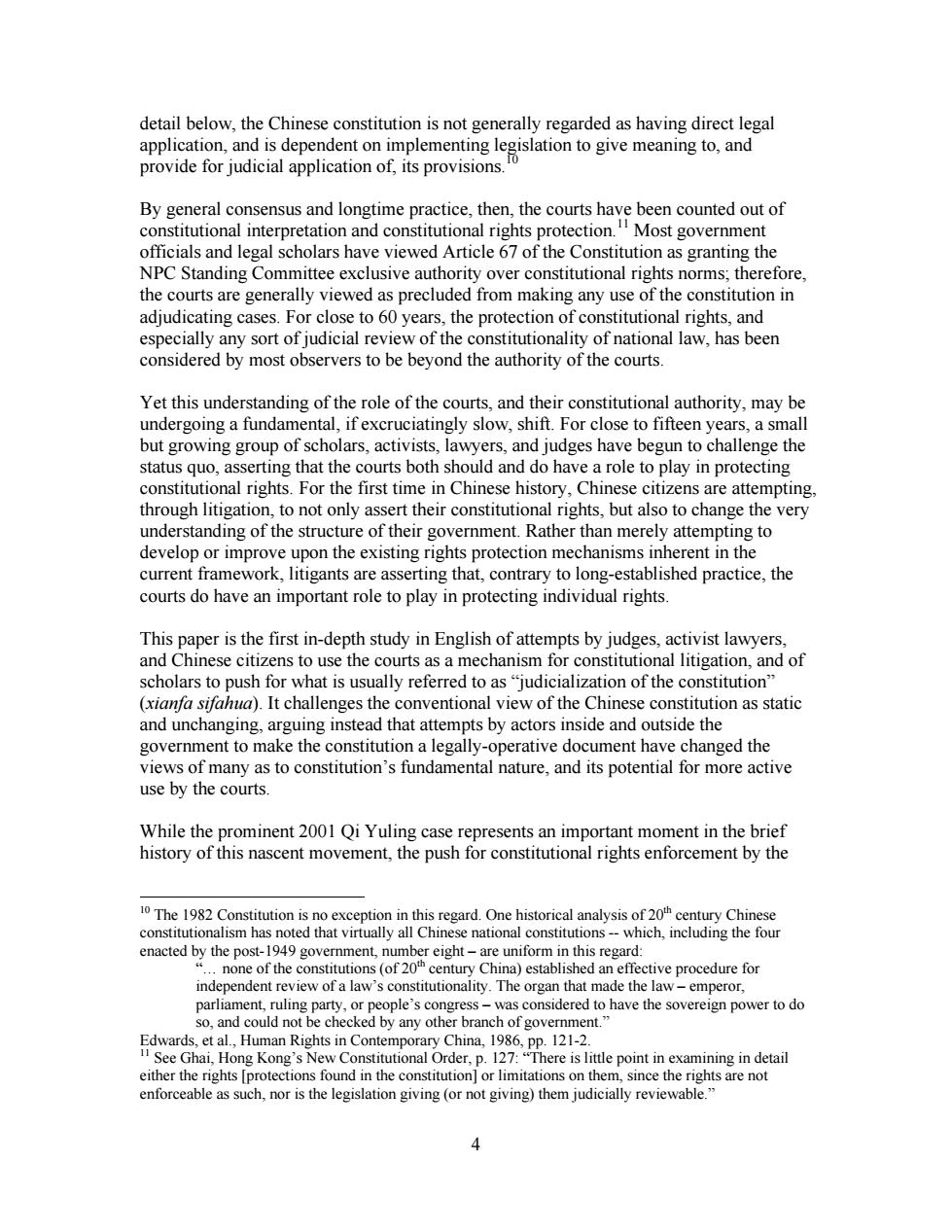
detail below,the Chinese constitution is not generally regarded as having direct legal application,and is dependent on implementing legislation to give meaning to,and provide for judicial application of,its provisions. By general consensus and longtime practice,then,the courts have been counted out of constitutional interpretation and constitutional rights protection.Most government officials and legal scholars have viewed Article 67 of the Constitution as granting the NPC Standing Committee exclusive authority over constitutional rights norms;therefore, the courts are generally viewed as precluded from making any use of the constitution in adjudicating cases.For close to 60 years,the protection of constitutional rights,and especially any sort of judicial review of the constitutionality of national law,has been considered by most observers to be beyond the authority of the courts. Yet this understanding of the role of the courts,and their constitutional authority,may be undergoing a fundamental,if excruciatingly slow,shift.For close to fifteen years,a small but growing group of scholars,activists,lawyers,and judges have begun to challenge the status quo,asserting that the courts both should and do have a role to play in protecting constitutional rights.For the first time in Chinese history,Chinese citizens are attempting through litigation,to not only assert their constitutional rights,but also to change the very understanding of the structure of their government.Rather than merely attempting to develop or improve upon the existing rights protection mechanisms inherent in the current framework,litigants are asserting that,contrary to long-established practice,the courts do have an important role to play in protecting individual rights. This paper is the first in-depth study in English of attempts by judges,activist lawyers, and Chinese citizens to use the courts as a mechanism for constitutional litigation,and of scholars to push for what is usually referred to as "judicialization of the constitution" (xianfa sifahua).It challenges the conventional view of the Chinese constitution as static and unchanging,arguing instead that attempts by actors inside and outside the government to make the constitution a legally-operative document have changed the views of many as to constitution's fundamental nature,and its potential for more active use by the courts. While the prominent 2001 Qi Yuling case represents an important moment in the brief history of this nascent movement,the push for constitutional rights enforcement by the 10The 1982 Constitution is no exception in this regard.One historical analysis of 20h century Chinese constitutionalism has noted that virtually all Chinese national constitutions--which,including the four enacted by the post-1949 government,number eight-are uniform in this regard: .none of the constitutions(of 20th century China)established an effective procedure for independent review of a law's constitutionality.The organ that made the law-emperor, parliament,ruling party,or people's congress-was considered to have the sovereign power to do so,and could not be checked by any other branch of government." Edwards,et al.,Human Rights in Contemporary China,1986,pp.121-2. See Ghai,Hong Kong's New Constitutional Order,p.127:"There is little point in examining in detail either the rights [protections found in the constitution]or limitations on them,since the rights are not enforceable as such,nor is the legislation giving(or not giving)them judicially reviewable." 4
4 detail below, the Chinese constitution is not generally regarded as having direct legal application, and is dependent on implementing legislation to give meaning to, and provide for judicial application of, its provisions.10 By general consensus and longtime practice, then, the courts have been counted out of constitutional interpretation and constitutional rights protection.11 Most government officials and legal scholars have viewed Article 67 of the Constitution as granting the NPC Standing Committee exclusive authority over constitutional rights norms; therefore, the courts are generally viewed as precluded from making any use of the constitution in adjudicating cases. For close to 60 years, the protection of constitutional rights, and especially any sort of judicial review of the constitutionality of national law, has been considered by most observers to be beyond the authority of the courts. Yet this understanding of the role of the courts, and their constitutional authority, may be undergoing a fundamental, if excruciatingly slow, shift. For close to fifteen years, a small but growing group of scholars, activists, lawyers, and judges have begun to challenge the status quo, asserting that the courts both should and do have a role to play in protecting constitutional rights. For the first time in Chinese history, Chinese citizens are attempting, through litigation, to not only assert their constitutional rights, but also to change the very understanding of the structure of their government. Rather than merely attempting to develop or improve upon the existing rights protection mechanisms inherent in the current framework, litigants are asserting that, contrary to long-established practice, the courts do have an important role to play in protecting individual rights. This paper is the first in-depth study in English of attempts by judges, activist lawyers, and Chinese citizens to use the courts as a mechanism for constitutional litigation, and of scholars to push for what is usually referred to as “judicialization of the constitution” (xianfa sifahua). It challenges the conventional view of the Chinese constitution as static and unchanging, arguing instead that attempts by actors inside and outside the government to make the constitution a legally-operative document have changed the views of many as to constitution’s fundamental nature, and its potential for more active use by the courts. While the prominent 2001 Qi Yuling case represents an important moment in the brief history of this nascent movement, the push for constitutional rights enforcement by the 10 The 1982 Constitution is no exception in this regard. One historical analysis of 20th century Chinese constitutionalism has noted that virtually all Chinese national constitutions -- which, including the four enacted by the post-1949 government, number eight – are uniform in this regard: “… none of the constitutions (of 20th century China) established an effective procedure for independent review of a law’s constitutionality. The organ that made the law – emperor, parliament, ruling party, or people’s congress – was considered to have the sovereign power to do so, and could not be checked by any other branch of government.” Edwards, et al., Human Rights in Contemporary China, 1986, pp. 121-2. 11 See Ghai, Hong Kong’s New Constitutional Order, p. 127: “There is little point in examining in detail either the rights [protections found in the constitution] or limitations on them, since the rights are not enforceable as such, nor is the legislation giving (or not giving) them judicially reviewable
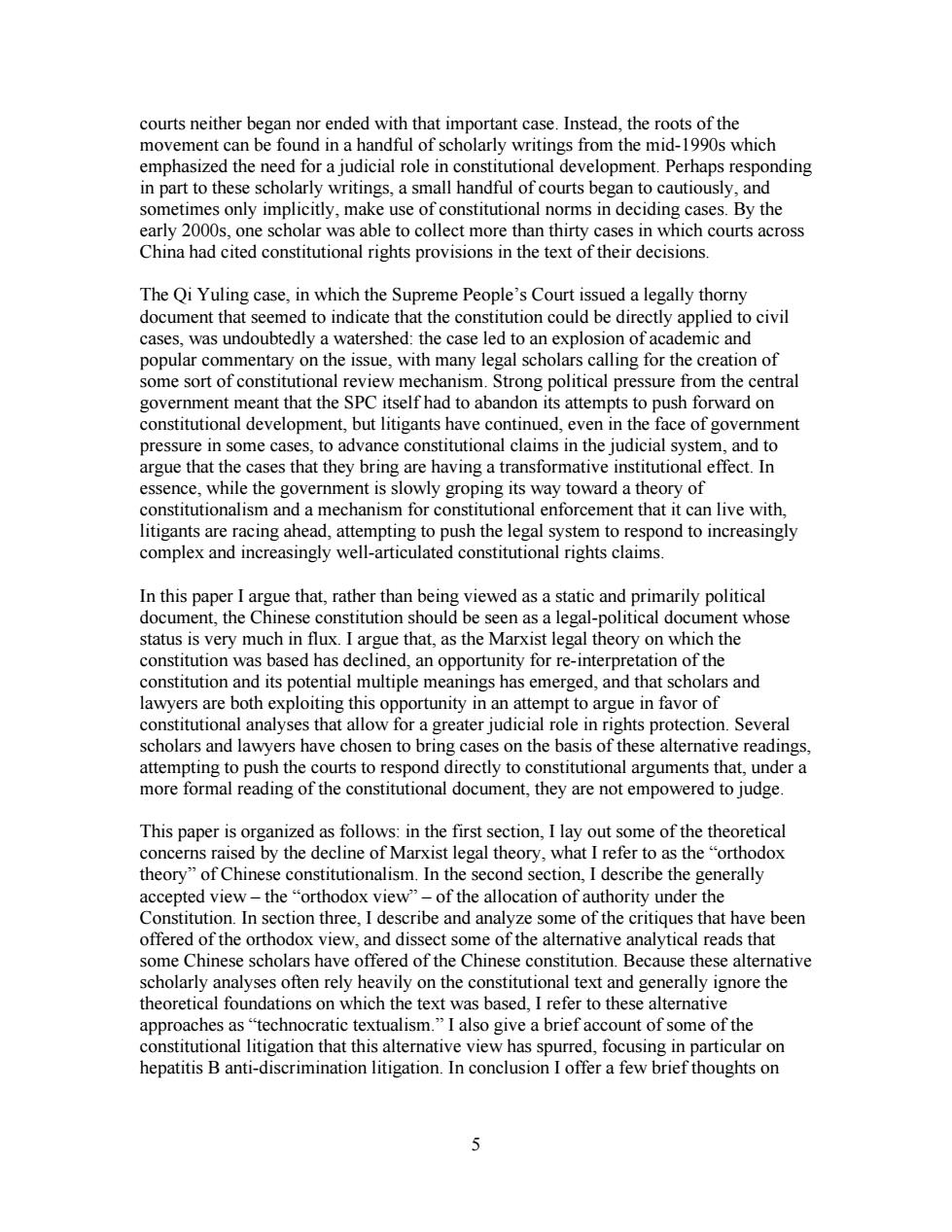
courts neither began nor ended with that important case.Instead,the roots of the movement can be found in a handful of scholarly writings from the mid-1990s which emphasized the need for a judicial role in constitutional development.Perhaps responding in part to these scholarly writings,a small handful of courts began to cautiously,and sometimes only implicitly,make use of constitutional norms in deciding cases.By the early 2000s,one scholar was able to collect more than thirty cases in which courts across China had cited constitutional rights provisions in the text of their decisions The Qi Yuling case,in which the Supreme People's Court issued a legally thorny document that seemed to indicate that the constitution could be directly applied to civil cases,was undoubtedly a watershed:the case led to an explosion of academic and popular commentary on the issue,with many legal scholars calling for the creation of some sort of constitutional review mechanism.Strong political pressure from the central government meant that the SPC itself had to abandon its attempts to push forward on constitutional development,but litigants have continued,even in the face of government pressure in some cases,to advance constitutional claims in the judicial system,and to argue that the cases that they bring are having a transformative institutional effect.In essence,while the government is slowly groping its way toward a theory of constitutionalism and a mechanism for constitutional enforcement that it can live with. litigants are racing ahead,attempting to push the legal system to respond to increasingly complex and increasingly well-articulated constitutional rights claims. In this paper I argue that,rather than being viewed as a static and primarily political document,the Chinese constitution should be seen as a legal-political document whose status is very much in flux.I argue that,as the Marxist legal theory on which the constitution was based has declined,an opportunity for re-interpretation of the constitution and its potential multiple meanings has emerged,and that scholars and lawyers are both exploiting this opportunity in an attempt to argue in favor of constitutional analyses that allow for a greater judicial role in rights protection.Several scholars and lawyers have chosen to bring cases on the basis of these alternative readings, attempting to push the courts to respond directly to constitutional arguments that,under a more formal reading of the constitutional document,they are not empowered to judge. This paper is organized as follows:in the first section,I lay out some of the theoretical concerns raised by the decline of Marxist legal theory,what I refer to as the "orthodox theory"of Chinese constitutionalism.In the second section,I describe the generally accepted view-the "orthodox view"-of the allocation of authority under the Constitution.In section three,I describe and analyze some of the critiques that have been offered of the orthodox view,and dissect some of the alternative analytical reads that some Chinese scholars have offered of the Chinese constitution.Because these alternative scholarly analyses often rely heavily on the constitutional text and generally ignore the theoretical foundations on which the text was based,I refer to these alternative approaches as "technocratic textualism."I also give a brief account of some of the constitutional litigation that this alternative view has spurred,focusing in particular on hepatitis B anti-discrimination litigation.In conclusion I offer a few brief thoughts on 5
5 courts neither began nor ended with that important case. Instead, the roots of the movement can be found in a handful of scholarly writings from the mid-1990s which emphasized the need for a judicial role in constitutional development. Perhaps responding in part to these scholarly writings, a small handful of courts began to cautiously, and sometimes only implicitly, make use of constitutional norms in deciding cases. By the early 2000s, one scholar was able to collect more than thirty cases in which courts across China had cited constitutional rights provisions in the text of their decisions. The Qi Yuling case, in which the Supreme People’s Court issued a legally thorny document that seemed to indicate that the constitution could be directly applied to civil cases, was undoubtedly a watershed: the case led to an explosion of academic and popular commentary on the issue, with many legal scholars calling for the creation of some sort of constitutional review mechanism. Strong political pressure from the central government meant that the SPC itself had to abandon its attempts to push forward on constitutional development, but litigants have continued, even in the face of government pressure in some cases, to advance constitutional claims in the judicial system, and to argue that the cases that they bring are having a transformative institutional effect. In essence, while the government is slowly groping its way toward a theory of constitutionalism and a mechanism for constitutional enforcement that it can live with, litigants are racing ahead, attempting to push the legal system to respond to increasingly complex and increasingly well-articulated constitutional rights claims. In this paper I argue that, rather than being viewed as a static and primarily political document, the Chinese constitution should be seen as a legal-political document whose status is very much in flux. I argue that, as the Marxist legal theory on which the constitution was based has declined, an opportunity for re-interpretation of the constitution and its potential multiple meanings has emerged, and that scholars and lawyers are both exploiting this opportunity in an attempt to argue in favor of constitutional analyses that allow for a greater judicial role in rights protection. Several scholars and lawyers have chosen to bring cases on the basis of these alternative readings, attempting to push the courts to respond directly to constitutional arguments that, under a more formal reading of the constitutional document, they are not empowered to judge. This paper is organized as follows: in the first section, I lay out some of the theoretical concerns raised by the decline of Marxist legal theory, what I refer to as the “orthodox theory” of Chinese constitutionalism. In the second section, I describe the generally accepted view – the “orthodox view” – of the allocation of authority under the Constitution. In section three, I describe and analyze some of the critiques that have been offered of the orthodox view, and dissect some of the alternative analytical reads that some Chinese scholars have offered of the Chinese constitution. Because these alternative scholarly analyses often rely heavily on the constitutional text and generally ignore the theoretical foundations on which the text was based, I refer to these alternative approaches as “technocratic textualism.” I also give a brief account of some of the constitutional litigation that this alternative view has spurred, focusing in particular on hepatitis B anti-discrimination litigation. In conclusion I offer a few brief thoughts on
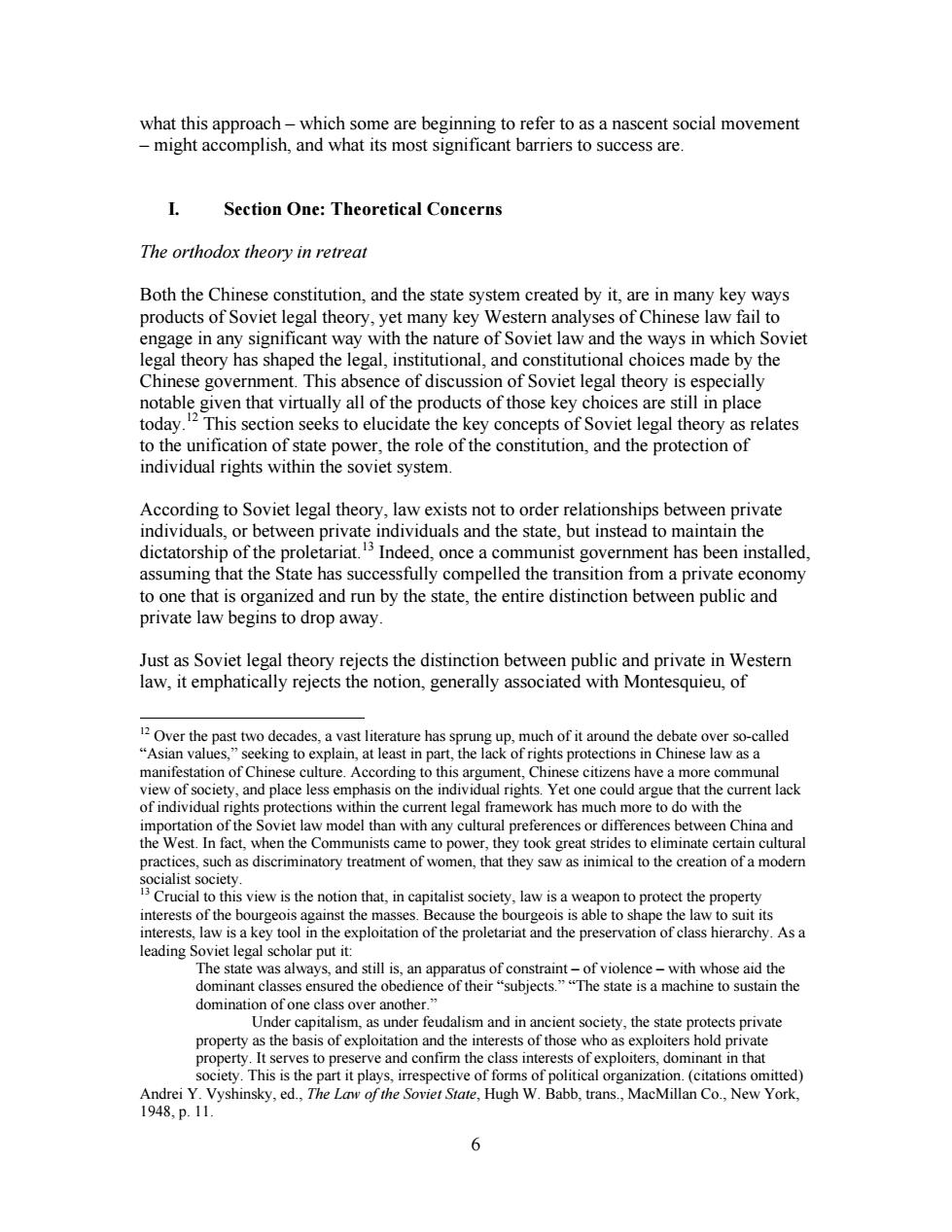
what this approach-which some are beginning to refer to as a nascent social movement -might accomplish,and what its most significant barriers to success are. I Section One:Theoretical Concerns The orthodox theory in retreat Both the Chinese constitution,and the state system created by it,are in many key ways products of Soviet legal theory,yet many key Western analyses of Chinese law fail to engage in any significant way with the nature of Soviet law and the ways in which Soviet legal theory has shaped the legal,institutional,and constitutional choices made by the Chinese government.This absence of discussion of Soviet legal theory is especially notable given that virtually all of the products of those key choices are still in place today.2 This section seeks to elucidate the key concepts of Soviet legal theory as relates to the unification of state power,the role of the constitution,and the protection of individual rights within the soviet system. According to Soviet legal theory,law exists not to order relationships between private individuals,or between private individuals and the state,but instead to maintain the dictatorship of the proletariat.3 Indeed,once a communist government has been installed, assuming that the State has successfully compelled the transition from a private economy to one that is organized and run by the state,the entire distinction between public and private law begins to drop away. Just as Soviet legal theory rejects the distinction between public and private in Western law,it emphatically rejects the notion,generally associated with Montesquieu,of 2Over the past two decades,a vast literature has sprung up,much of it around the debate over so-called "Asian values,"seeking to explain,at least in part,the lack of rights protections in Chinese law as a manifestation of Chinese culture.According to this argument,Chinese citizens have a more communal view of society,and place less emphasis on the individual rights.Yet one could argue that the current lack of individual rights protections within the current legal framework has much more to do with the importation of the Soviet law model than with any cultural preferences or differences between China and the West.In fact,when the Communists came to power,they took great strides to eliminate certain cultural practices,such as discriminatory treatment of women,that they saw as inimical to the creation of a modern socialist society. Crucial to this view is the notion that,in capitalist society,law is a weapon to protect the property interests of the bourgeois against the masses.Because the bourgeois is able to shape the law to suit its interests,law is a key tool in the exploitation of the proletariat and the preservation of class hierarchy.As a leading Soviet legal scholar put it: The state was always,and still is,an apparatus of constraint-of violence-with whose aid the dominant classes ensured the obedience of their"subjects.""The state is a machine to sustain the domination of one class over another." Under capitalism,as under feudalism and in ancient society,the state protects private property as the basis of exploitation and the interests of those who as exploiters hold private property.It serves to preserve and confirm the class interests of exploiters,dominant in that society.This is the part it plays,irrespective of forms of political organization.(citations omitted) Andrei Y.Vyshinsky,ed.,The Law of the Soviet State,Hugh W.Babb,trans.,MacMillan Co.,New York, 1948,p.11. 6
6 what this approach – which some are beginning to refer to as a nascent social movement – might accomplish, and what its most significant barriers to success are. I. Section One: Theoretical Concerns The orthodox theory in retreat Both the Chinese constitution, and the state system created by it, are in many key ways products of Soviet legal theory, yet many key Western analyses of Chinese law fail to engage in any significant way with the nature of Soviet law and the ways in which Soviet legal theory has shaped the legal, institutional, and constitutional choices made by the Chinese government. This absence of discussion of Soviet legal theory is especially notable given that virtually all of the products of those key choices are still in place today.12 This section seeks to elucidate the key concepts of Soviet legal theory as relates to the unification of state power, the role of the constitution, and the protection of individual rights within the soviet system. According to Soviet legal theory, law exists not to order relationships between private individuals, or between private individuals and the state, but instead to maintain the dictatorship of the proletariat.13 Indeed, once a communist government has been installed, assuming that the State has successfully compelled the transition from a private economy to one that is organized and run by the state, the entire distinction between public and private law begins to drop away. Just as Soviet legal theory rejects the distinction between public and private in Western law, it emphatically rejects the notion, generally associated with Montesquieu, of 12 Over the past two decades, a vast literature has sprung up, much of it around the debate over so-called “Asian values,” seeking to explain, at least in part, the lack of rights protections in Chinese law as a manifestation of Chinese culture. According to this argument, Chinese citizens have a more communal view of society, and place less emphasis on the individual rights. Yet one could argue that the current lack of individual rights protections within the current legal framework has much more to do with the importation of the Soviet law model than with any cultural preferences or differences between China and the West. In fact, when the Communists came to power, they took great strides to eliminate certain cultural practices, such as discriminatory treatment of women, that they saw as inimical to the creation of a modern socialist society. 13 Crucial to this view is the notion that, in capitalist society, law is a weapon to protect the property interests of the bourgeois against the masses. Because the bourgeois is able to shape the law to suit its interests, law is a key tool in the exploitation of the proletariat and the preservation of class hierarchy. As a leading Soviet legal scholar put it: The state was always, and still is, an apparatus of constraint – of violence – with whose aid the dominant classes ensured the obedience of their “subjects.” “The state is a machine to sustain the domination of one class over another.” Under capitalism, as under feudalism and in ancient society, the state protects private property as the basis of exploitation and the interests of those who as exploiters hold private property. It serves to preserve and confirm the class interests of exploiters, dominant in that society. This is the part it plays, irrespective of forms of political organization. (citations omitted) Andrei Y. Vyshinsky, ed., The Law of the Soviet State, Hugh W. Babb, trans., MacMillan Co., New York, 1948, p. 11
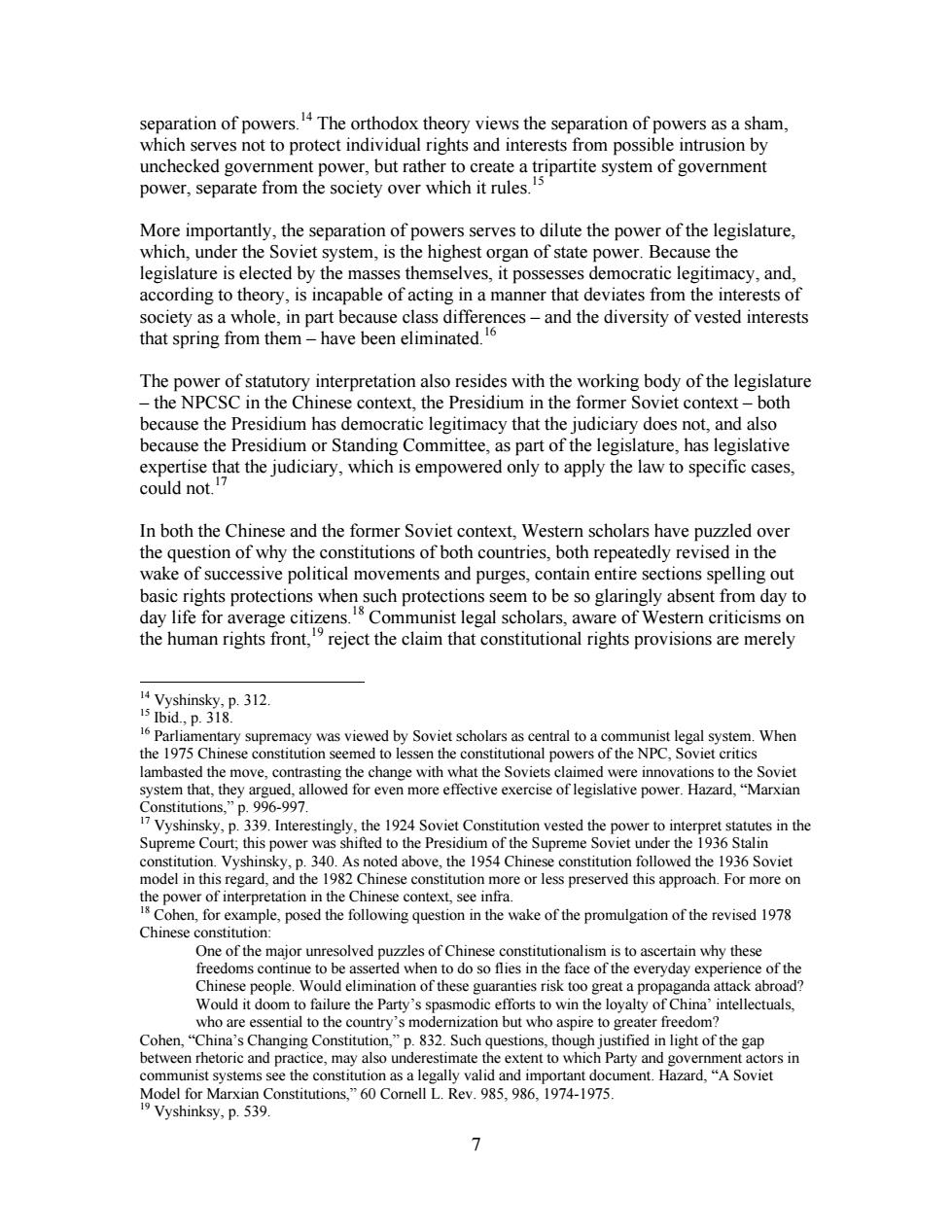
separation of powers.4 The orthodox theory views the separation of powers as a sham, which serves not to protect individual rights and interests from possible intrusion by unchecked government power,but rather to create a tripartite system of government power,separate from the society over which it rules.15 More importantly,the separation of powers serves to dilute the power of the legislature, which,under the Soviet system,is the highest organ of state power.Because the legislature is elected by the masses themselves,it possesses democratic legitimacy,and, according to theory,is incapable of acting in a manner that deviates from the interests of society as a whole,in part because class differences-and the diversity of vested interests that spring from them-have been eliminated.16 The power of statutory interpretation also resides with the working body of the legislature the NPCSC in the Chinese context,the Presidium in the former Soviet context-both because the Presidium has democratic legitimacy that the judiciary does not,and also because the Presidium or Standing Committee,as part of the legislature,has legislative expertise that the judiciary,which is empowered only to apply the law to specific cases, could not.7 In both the Chinese and the former Soviet context,Western scholars have puzzled over the question of why the constitutions of both countries,both repeatedly revised in the wake of successive political movements and purges,contain entire sections spelling out basic rights protections when such protections seem to be so glaringly absent from day to day life for average citizens.Communist legal scholars,aware of Western criticisms on the human rights front,reject the claim that constitutional rights provisions are merely 14 Vyshinsky,p.312 15 Ibid.,p.318. 6 Parliamentary supremacy was viewed by Soviet scholars as central to a communist legal system.When the 1975 Chinese constitution seemed to lessen the constitutional powers of the NPC,Soviet critics lambasted the move,contrasting the change with what the Soviets claimed were innovations to the Soviet system that,they argued,allowed for even more effective exercise of legislative power.Hazard,"Marxian Constitutions,"p.996-997. 7 Vyshinsky,p.339.Interestingly,the 1924 Soviet Constitution vested the power to interpret statutes in the Supreme Court;this power was shifted to the Presidium of the Supreme Soviet under the 1936 Stalin constitution.Vyshinsky,p.340.As noted above,the 1954 Chinese constitution followed the 1936 Soviet model in this regard,and the 1982 Chinese constitution more or less preserved this approach.For more on the power of interpretation in the Chinese context,see infra. sCohen,for example,posed the following question in the wake of the promulgation of the revised 1978 Chinese constitution: One of the major unresolved puzzles of Chinese constitutionalism is to ascertain why these freedoms continue to be asserted when to do so flies in the face of the everyday experience of the Chinese people.Would elimination of these guaranties risk too great a propaganda attack abroad? Would it doom to failure the Party's spasmodic efforts to win the loyalty of China'intellectuals, who are essential to the country's modernization but who aspire to greater freedom? Cohen,"China's Changing Constitution,"p.832.Such questions,though justified in light of the gap between rhetoric and practice,may also underestimate the extent to which Party and government actors in communist systems see the constitution as a legally valid and important document.Hazard,"A Soviet Model for Marxian Constitutions,"60 Cornell L.Rev.985,986,1974-1975. 19 Vyshinksy,p.539
7 separation of powers.14 The orthodox theory views the separation of powers as a sham, which serves not to protect individual rights and interests from possible intrusion by unchecked government power, but rather to create a tripartite system of government power, separate from the society over which it rules.15 More importantly, the separation of powers serves to dilute the power of the legislature, which, under the Soviet system, is the highest organ of state power. Because the legislature is elected by the masses themselves, it possesses democratic legitimacy, and, according to theory, is incapable of acting in a manner that deviates from the interests of society as a whole, in part because class differences – and the diversity of vested interests that spring from them – have been eliminated.16 The power of statutory interpretation also resides with the working body of the legislature – the NPCSC in the Chinese context, the Presidium in the former Soviet context – both because the Presidium has democratic legitimacy that the judiciary does not, and also because the Presidium or Standing Committee, as part of the legislature, has legislative expertise that the judiciary, which is empowered only to apply the law to specific cases, could not.17 In both the Chinese and the former Soviet context, Western scholars have puzzled over the question of why the constitutions of both countries, both repeatedly revised in the wake of successive political movements and purges, contain entire sections spelling out basic rights protections when such protections seem to be so glaringly absent from day to day life for average citizens.18 Communist legal scholars, aware of Western criticisms on the human rights front,19 reject the claim that constitutional rights provisions are merely 14 Vyshinsky, p. 312. 15 Ibid., p. 318. 16 Parliamentary supremacy was viewed by Soviet scholars as central to a communist legal system. When the 1975 Chinese constitution seemed to lessen the constitutional powers of the NPC, Soviet critics lambasted the move, contrasting the change with what the Soviets claimed were innovations to the Soviet system that, they argued, allowed for even more effective exercise of legislative power. Hazard, “Marxian Constitutions,” p. 996-997. 17 Vyshinsky, p. 339. Interestingly, the 1924 Soviet Constitution vested the power to interpret statutes in the Supreme Court; this power was shifted to the Presidium of the Supreme Soviet under the 1936 Stalin constitution. Vyshinsky, p. 340. As noted above, the 1954 Chinese constitution followed the 1936 Soviet model in this regard, and the 1982 Chinese constitution more or less preserved this approach. For more on the power of interpretation in the Chinese context, see infra. 18 Cohen, for example, posed the following question in the wake of the promulgation of the revised 1978 Chinese constitution: One of the major unresolved puzzles of Chinese constitutionalism is to ascertain why these freedoms continue to be asserted when to do so flies in the face of the everyday experience of the Chinese people. Would elimination of these guaranties risk too great a propaganda attack abroad? Would it doom to failure the Party’s spasmodic efforts to win the loyalty of China’ intellectuals, who are essential to the country’s modernization but who aspire to greater freedom? Cohen, “China’s Changing Constitution,” p. 832. Such questions, though justified in light of the gap between rhetoric and practice, may also underestimate the extent to which Party and government actors in communist systems see the constitution as a legally valid and important document. Hazard, “A Soviet Model for Marxian Constitutions,” 60 Cornell L. Rev. 985, 986, 1974-1975. 19 Vyshinksy, p. 539
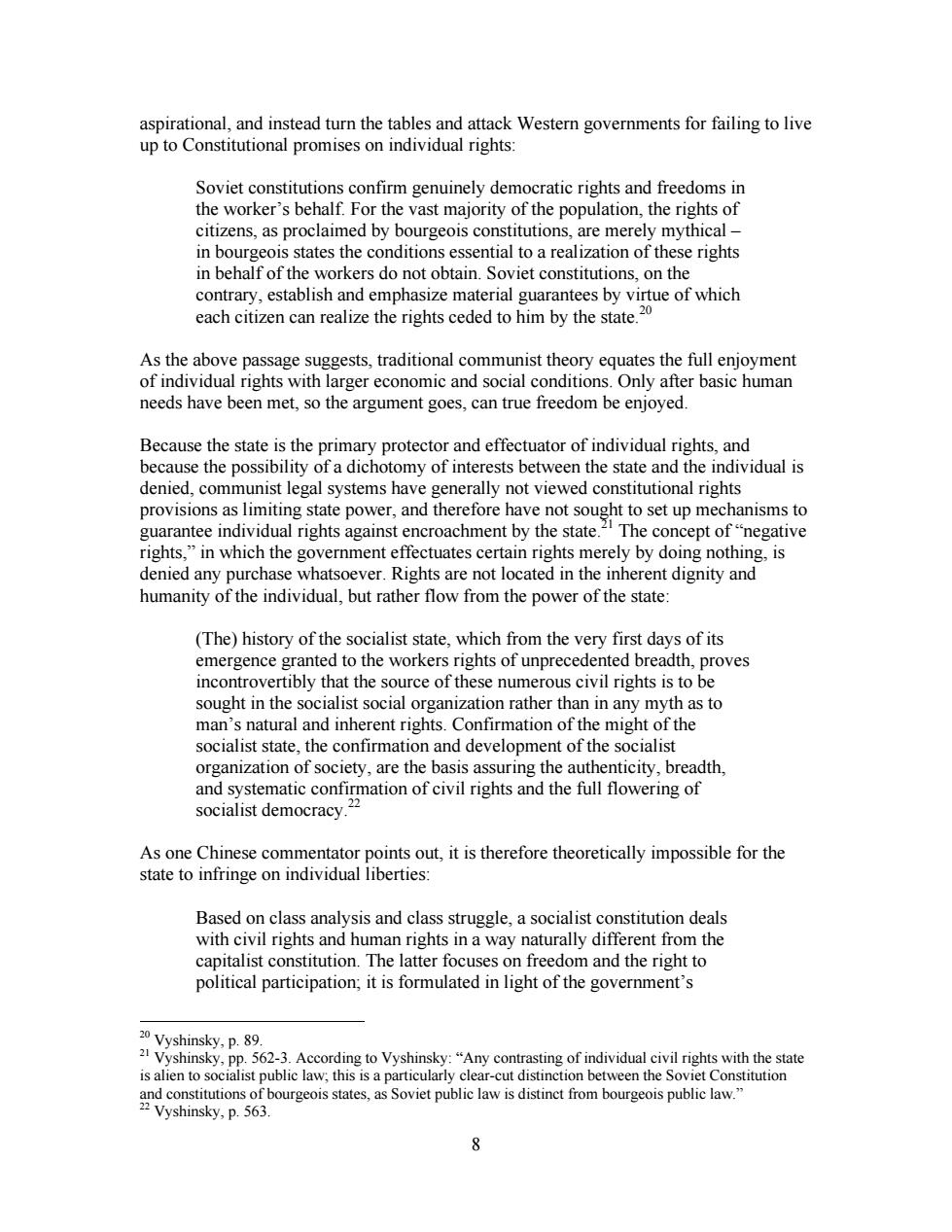
aspirational,and instead turn the tables and attack Western governments for failing to live up to Constitutional promises on individual rights: Soviet constitutions confirm genuinely democratic rights and freedoms in the worker's behalf.For the vast majority of the population,the rights of citizens,as proclaimed by bourgeois constitutions,are merely mythical- in bourgeois states the conditions essential to a realization of these rights in behalf of the workers do not obtain.Soviet constitutions,on the contrary,establish and emphasize material guarantees by virtue of which each citizen can realize the rights ceded to him by the state20 As the above passage suggests,traditional communist theory equates the full enjoyment of individual rights with larger economic and social conditions.Only after basic human needs have been met,so the argument goes,can true freedom be enjoyed. Because the state is the primary protector and effectuator of individual rights,and because the possibility of a dichotomy of interests between the state and the individual is denied,communist legal systems have generally not viewed constitutional rights provisions as limiting state power,and therefore have not sought to set up mechanisms to guarantee individual rights against encroachment by the state.The concept of"negative rights,"in which the government effectuates certain rights merely by doing nothing,is denied any purchase whatsoever.Rights are not located in the inherent dignity and humanity of the individual,but rather flow from the power of the state: (The)history of the socialist state,which from the very first days of its emergence granted to the workers rights of unprecedented breadth,proves incontrovertibly that the source of these numerous civil rights is to be sought in the socialist social organization rather than in any myth as to man's natural and inherent rights.Confirmation of the might of the socialist state,the confirmation and development of the socialist organization of society,are the basis assuring the authenticity,breadth, and systematic confirmation of civil rights and the full flowering of socialist democracy22 As one Chinese commentator points out,it is therefore theoretically impossible for the state to infringe on individual liberties: Based on class analysis and class struggle,a socialist constitution deals with civil rights and human rights in a way naturally different from the capitalist constitution.The latter focuses on freedom and the right to political participation;it is formulated in light of the government's 20 Vyshinsky,p.89. 2Vyshinsky,pp.562-3.According to Vyshinsky:"Any contrasting of individual civil rights with the state is alien to socialist public law,this is a particularly clear-cut distinction between the Soviet Constitution tates,Sovet publi ws distinet mopublic aw. 8
8 aspirational, and instead turn the tables and attack Western governments for failing to live up to Constitutional promises on individual rights: Soviet constitutions confirm genuinely democratic rights and freedoms in the worker’s behalf. For the vast majority of the population, the rights of citizens, as proclaimed by bourgeois constitutions, are merely mythical – in bourgeois states the conditions essential to a realization of these rights in behalf of the workers do not obtain. Soviet constitutions, on the contrary, establish and emphasize material guarantees by virtue of which each citizen can realize the rights ceded to him by the state.20 As the above passage suggests, traditional communist theory equates the full enjoyment of individual rights with larger economic and social conditions. Only after basic human needs have been met, so the argument goes, can true freedom be enjoyed. Because the state is the primary protector and effectuator of individual rights, and because the possibility of a dichotomy of interests between the state and the individual is denied, communist legal systems have generally not viewed constitutional rights provisions as limiting state power, and therefore have not sought to set up mechanisms to guarantee individual rights against encroachment by the state.21 The concept of “negative rights,” in which the government effectuates certain rights merely by doing nothing, is denied any purchase whatsoever. Rights are not located in the inherent dignity and humanity of the individual, but rather flow from the power of the state: (The) history of the socialist state, which from the very first days of its emergence granted to the workers rights of unprecedented breadth, proves incontrovertibly that the source of these numerous civil rights is to be sought in the socialist social organization rather than in any myth as to man’s natural and inherent rights. Confirmation of the might of the socialist state, the confirmation and development of the socialist organization of society, are the basis assuring the authenticity, breadth, and systematic confirmation of civil rights and the full flowering of socialist democracy.22 As one Chinese commentator points out, it is therefore theoretically impossible for the state to infringe on individual liberties: Based on class analysis and class struggle, a socialist constitution deals with civil rights and human rights in a way naturally different from the capitalist constitution. The latter focuses on freedom and the right to political participation; it is formulated in light of the government’s 20 Vyshinsky, p. 89. 21 Vyshinsky, pp. 562-3. According to Vyshinsky: “Any contrasting of individual civil rights with the state is alien to socialist public law; this is a particularly clear-cut distinction between the Soviet Constitution and constitutions of bourgeois states, as Soviet public law is distinct from bourgeois public law.” 22 Vyshinsky, p. 563
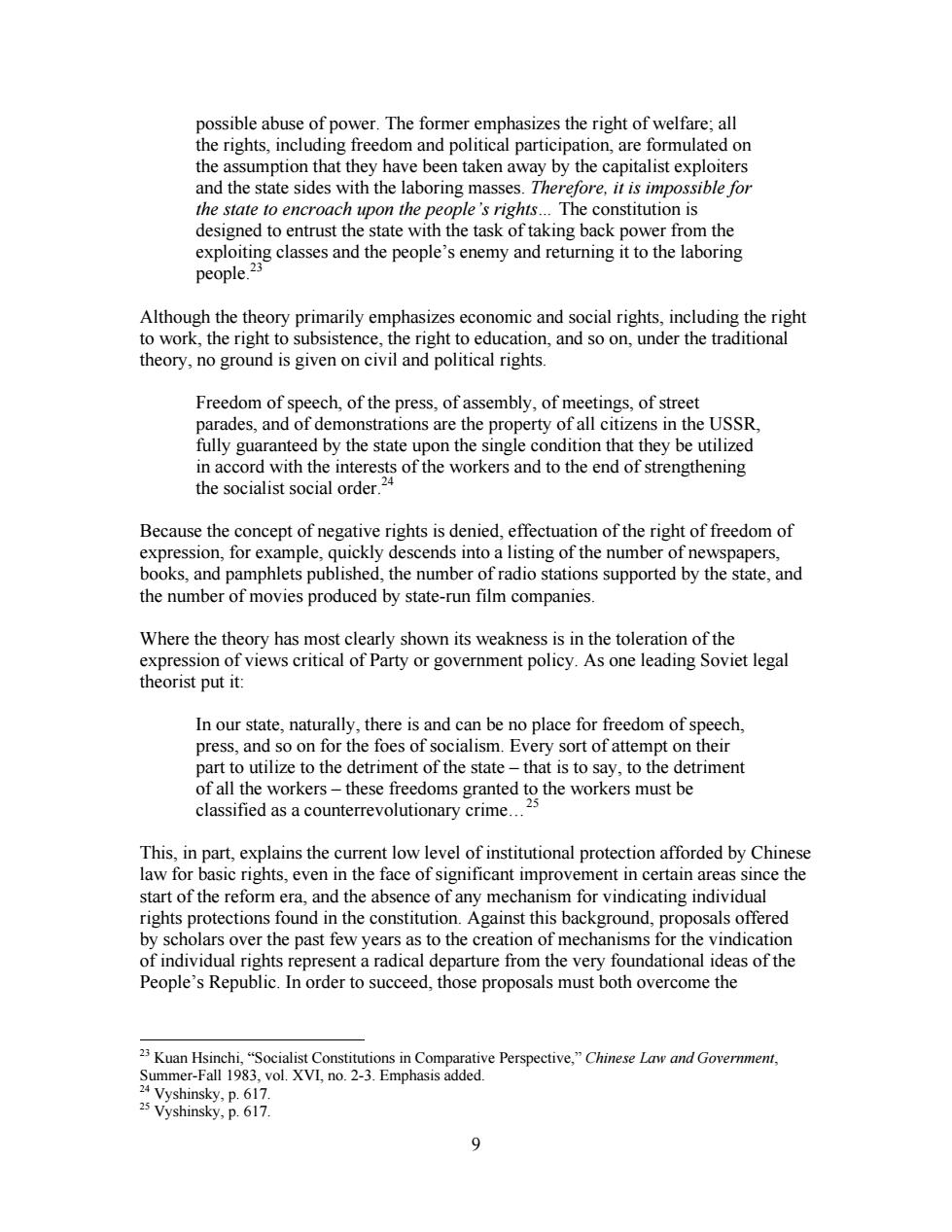
possible abuse of power.The former emphasizes the right of welfare;all the rights,including freedom and political participation,are formulated on the assumption that they have been taken away by the capitalist exploiters and the state sides with the laboring masses.Therefore,it is impossible for the state to encroach upon the people's rights...The constitution is designed to entrust the state with the task of taking back power from the exploiting classes and the people's enemy and returning it to the laboring people.23 Although the theory primarily emphasizes economic and social rights,including the right to work,the right to subsistence,the right to education,and so on,under the traditional theory,no ground is given on civil and political rights. Freedom of speech,of the press,of assembly,of meetings,of street parades,and of demonstrations are the property of all citizens in the USSR, fully guaranteed by the state upon the single condition that they be utilized in accord with the interests of the workers and to the end of strengthening the socialist social order. Because the concept of negative rights is denied,effectuation of the right of freedom of expression,for example,quickly descends into a listing of the number of newspapers, books,and pamphlets published,the number of radio stations supported by the state,and the number of movies produced by state-run film companies. Where the theory has most clearly shown its weakness is in the toleration of the expression of views critical of Party or government policy.As one leading Soviet legal theorist put it: In our state,naturally,there is and can be no place for freedom of speech, press,and so on for the foes of socialism.Every sort of attempt on their part to utilize to the detriment of the state-that is to say,to the detriment of all the workers-these freedoms granted to the workers must be 25 classified as a counterrevolutionary crime... This,in part,explains the current low level of institutional protection afforded by Chinese law for basic rights,even in the face of significant improvement in certain areas since the start of the reform era,and the absence of any mechanism for vindicating individual rights protections found in the constitution.Against this background,proposals offered by scholars over the past few years as to the creation of mechanisms for the vindication of individual rights represent a radical departure from the very foundational ideas of the People's Republic.In order to succeed,those proposals must both overcome the 23 Kuan Hsinchi,"Socialist Constitutions in Comparative Perspective,"Chinese Law and Government, Summer-Fall 1983,vol.XVI,no.2-3.Emphasis added. 24 Vyshinsky,p.617. 25 Vyshinsky,p.617. 9
9 possible abuse of power. The former emphasizes the right of welfare; all the rights, including freedom and political participation, are formulated on the assumption that they have been taken away by the capitalist exploiters and the state sides with the laboring masses. Therefore, it is impossible for the state to encroach upon the people’s rights… The constitution is designed to entrust the state with the task of taking back power from the exploiting classes and the people’s enemy and returning it to the laboring people.23 Although the theory primarily emphasizes economic and social rights, including the right to work, the right to subsistence, the right to education, and so on, under the traditional theory, no ground is given on civil and political rights. Freedom of speech, of the press, of assembly, of meetings, of street parades, and of demonstrations are the property of all citizens in the USSR, fully guaranteed by the state upon the single condition that they be utilized in accord with the interests of the workers and to the end of strengthening the socialist social order.24 Because the concept of negative rights is denied, effectuation of the right of freedom of expression, for example, quickly descends into a listing of the number of newspapers, books, and pamphlets published, the number of radio stations supported by the state, and the number of movies produced by state-run film companies. Where the theory has most clearly shown its weakness is in the toleration of the expression of views critical of Party or government policy. As one leading Soviet legal theorist put it: In our state, naturally, there is and can be no place for freedom of speech, press, and so on for the foes of socialism. Every sort of attempt on their part to utilize to the detriment of the state – that is to say, to the detriment of all the workers – these freedoms granted to the workers must be classified as a counterrevolutionary crime…25 This, in part, explains the current low level of institutional protection afforded by Chinese law for basic rights, even in the face of significant improvement in certain areas since the start of the reform era, and the absence of any mechanism for vindicating individual rights protections found in the constitution. Against this background, proposals offered by scholars over the past few years as to the creation of mechanisms for the vindication of individual rights represent a radical departure from the very foundational ideas of the People’s Republic. In order to succeed, those proposals must both overcome the 23 Kuan Hsinchi, “Socialist Constitutions in Comparative Perspective,” Chinese Law and Government, Summer-Fall 1983, vol. XVI, no. 2-3. Emphasis added. 24 Vyshinsky, p. 617. 25 Vyshinsky, p. 617